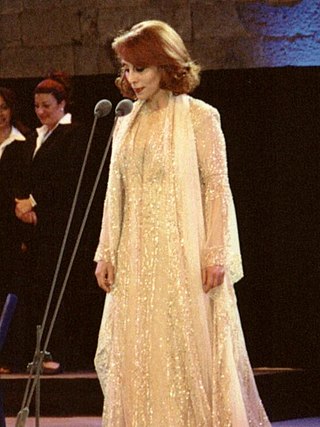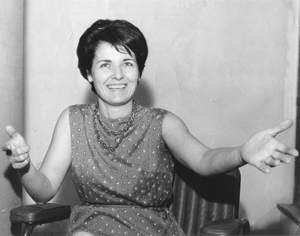Related Research Articles

The American University of Beirut is a private, non-sectarian, and independent university chartered in New York with its campus in Beirut, Lebanon. AUB is governed by a private, autonomous board of trustees and offers programs leading to bachelor's, master's, MD, and PhD degrees.

Nouhad Wadie Haddad, known as Fairuz, is a Lebanese singer. She is widely considered an iconic vocalist and one of the most celebrated singers in the history of the Arab world. She is popularly known as "The Bird of the East", "The Cedar of Lebanon", "The Moon's Neighbor", and "The Voice of Lebanon", among others.
Samir Kassir was a Lebanese-Palestinian journalist of An-Nahar and professor of history at Saint-Joseph University, who was an advocate of democracy and prominent opponent of the Syrian occupation of Lebanon. He was assassinated in 2005 as part of a series of assassinations of anti-Syria Lebanese political figures such as Rafic Hariri and George Hawi.

Nadine Labaki is a Lebanese and Canadian actress, director, and activist. Labaki first came into the spotlight as an actress in the early 2000s. Her filmmaking career began in 2007 after the release of her debut film, Caramel, which premiered at the Cannes Film Festival. She is known for demonstrating everyday aspects of Lebanese life and covering a range of political issues such as war, poverty, and feminism. She is the first female Arab director to be nominated for an Oscar in the category for Best Foreign Language Film for her third directorial effort, Capernaum (2018).
Hoda Barakat is a Lebanese novelist. She lived most of her early life in Beirut before moving to Paris, where she now resides. She has published six novels, two plays, a book of short stories, and a book of memoirs. Her works are originally written in Arabic and have been translated into English, Hebrew, French, Italian, Spanish, Turkish, Romanian, Dutch, Brazilian Portuguese, and Greek.
Ghadah Al-Samman is a Syrian writer, journalist and novelist born in Damascus in 1942 to a prominent and conservative Damascene family. Her father was Ahmed Al-Samman, a president of the University of Damascus. She is distantly related to poet Nizar Qabbani, and was deeply influenced by him after her mother died at a very young age.
Syrian literature is modern fiction written or orally performed in Arabic by writers from Syria since the independence of the Syrian Arab Republic in 1946. It is part of the historically and geographically wider Arabic literature. Literary works by Syrian authors in the historical region of Syria since the Umayyad era are considered general Arabic literature. In its historical development since the beginnings of compilations of the Quran in the 7th century and later written records, the Arabic language has been considered a geographically comprehensive, standardized written language due to the religious or literary works written in classical Arabic. This sometimes differs considerably from the individual regionally spoken variants, such as Syrian, Egyptian or Moroccan spoken forms of Arabic.

Emily Daoud Nasrallah was a Lebanese writer and women's rights activist.

Bachir Pierre Gemayel was a Lebanese militia commander who led the Lebanese Forces, the military wing of the Kataeb Party, in the Lebanese Civil War and was elected President of Lebanon in 1982.
Tarif Khalidi is a Palestinian historian who now holds the Shaykh Zayid Chair in Islamic and Arabic Studies at the American University of Beirut in Lebanon.

Rima Maktabi is a Lebanese TV presenter and award-winning journalist who returned to al-Arabiya after hosting CNN's monthly program Inside the Middle East for two years and previously working at the Arab satellite channel since 2005. She was among several female Arab journalists who first became known through her reporting during the 2006 Lebanon War and who had successful careers afterward, including Maktabi and her former colleague at al-Arabiya Najwa Qassem.

The American University of Science and Technology is a private, non-sectarian, and co-educational American university in Lebanon.

Salma Khadra Jayyusi was a Palestinian poet, writer, translator and anthologist. She was the founder and director of the Project of Translation from Arabic (PROTA), which aims to provide translation of Arabic literature into English.
Tawfiq Yusuf 'Awwad was a Lebanese writer and diplomat. His 1939 novel Al-Raghif, inspired by Arab resistance to the Turks in World War I, "was quickly recognized as a landmark in the literary expression of Arab nationalism". His only other novel, Death In Beirut, was similarly well-regarded. 'Awwad also wrote poetry, essays, and plays. He was killed in a bombing in 1989 during the Lebanese Civil War.
The Hakawati is a novel written by Rabih Alameddine and published by Alfred A. Knopf in 2008. The novel explores Lebanese families and cultures, and was well received by critics.

Saniya M. Habboub was a Lebanese medical doctor. She was the first Lebanese woman to study medicine abroad and to graduate from the Woman's Medical College of Pennsylvania, where she earned her medical degree in 1931. Later she worked with the Lebanese Red Cross.
Janet Lee Stevens was an American journalist, human rights advocate, translator, and scholar of popular Arabic theater. She lived in Beirut during the Lebanese Civil War and chronicled the experiences of Palestinian refugees before and after the Sabra and Shatila Massacre of September 16–18, 1982.
Esther Moyal was a Lebanese Jewish journalist, writer and women's rights activist. She has been described as a key intellectual in the 20th century Nahda, or Arab Renaissance.
Maya Abu Al-Hayat (1980) is a Palestinian novelist, poet, storyteller, and translator, born in Beirut. She has published three novels and three collections of poetry. Her books have gained worldwide recognition, and some of her stories have been translated into different languages. Abu Al-Hayat also worked as an actress and ran the Palestine Writing Workshop. Abu Al-Hayat played a prominent role in children's literature, writing and presenting television programs for children, including "Iftah Ya Simsim," and was distinguished by her writing of children's stories.
Bayan Nuwayhed is a Palestinian journalist, academic, historian and a member of the Palestine Liberation Organization (PLO). She is one of the leading historians of Palestine and is the author of the book entitled Sabra and Shatila: September 1982.
References
- 1 2 3 4 5 "A cyber-platform for Arab culture". First Jordan. Archived from the original on 7 July 2011. Retrieved 21 April 2020.
- 1 2 3 "Al-hakawati officers and management". Al-hakawati. Archived from the original on 24 December 2008. Retrieved 21 April 2020.